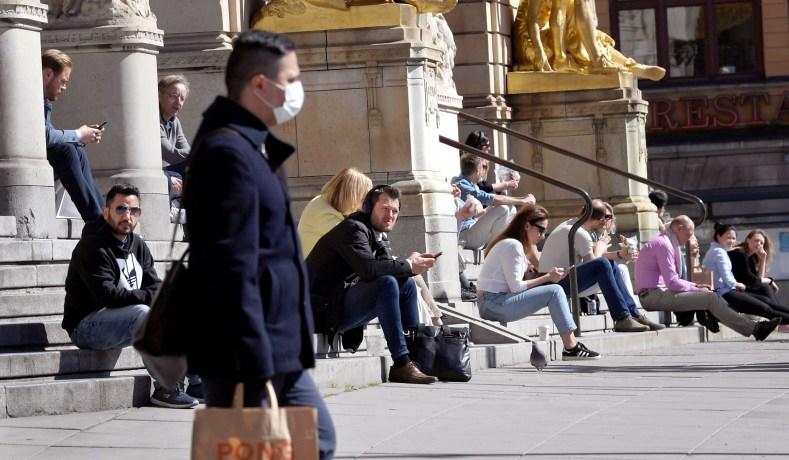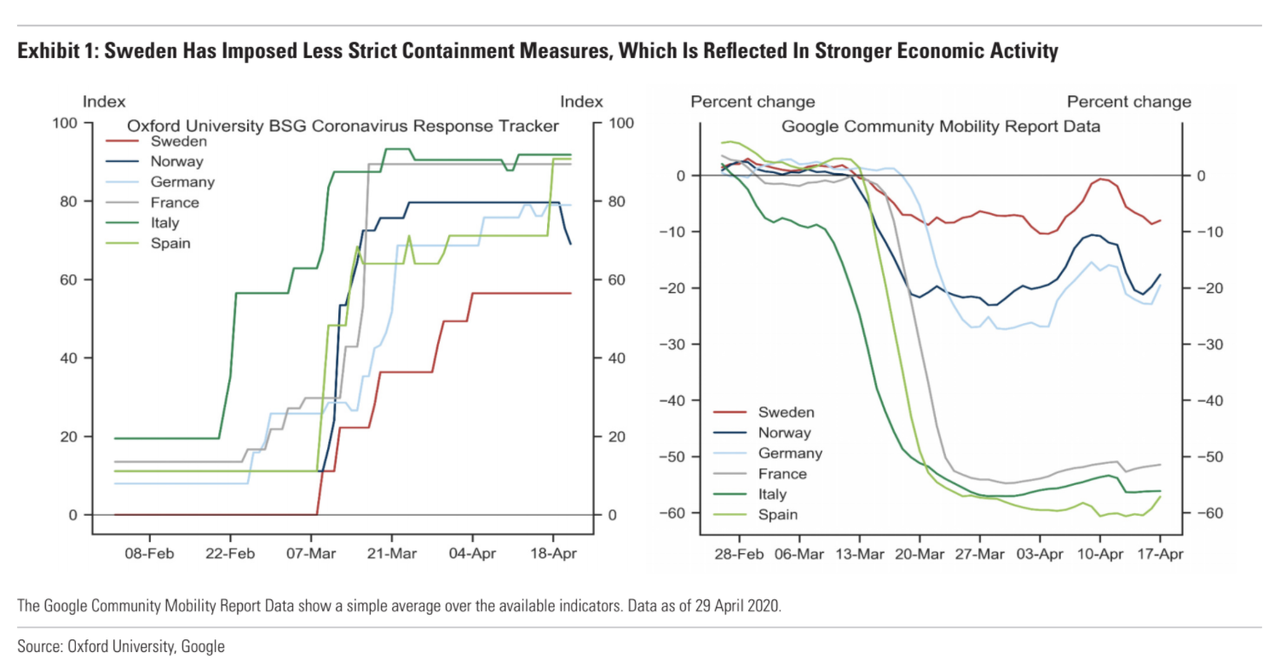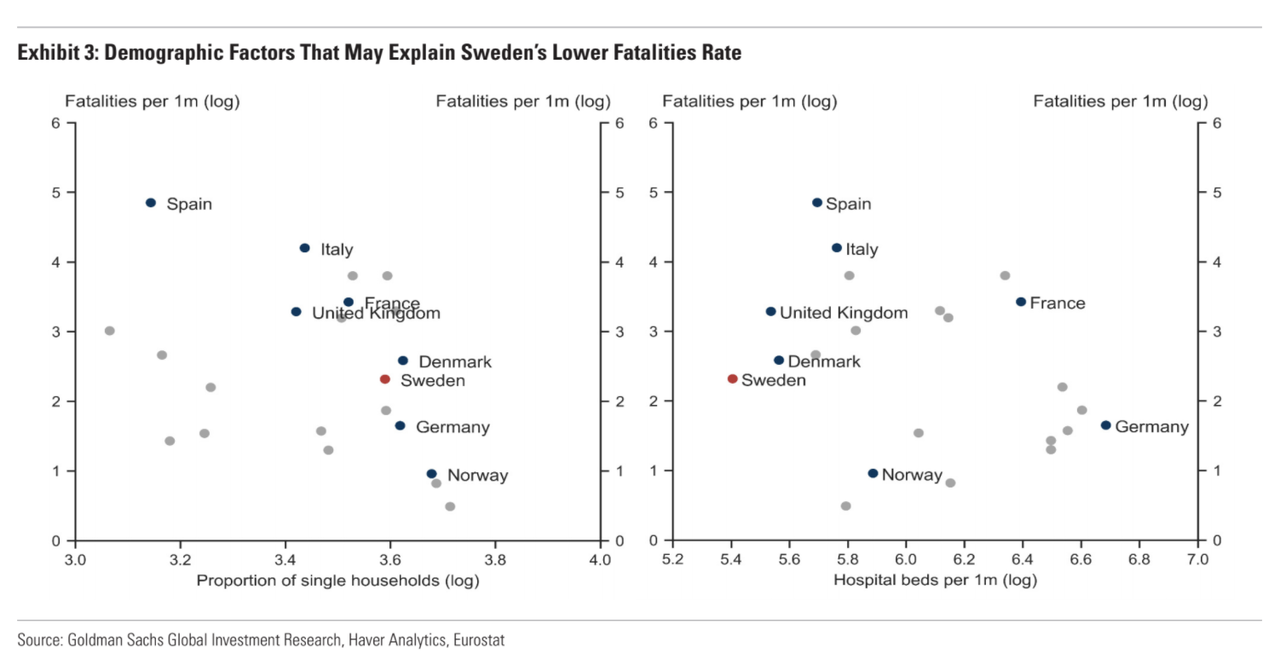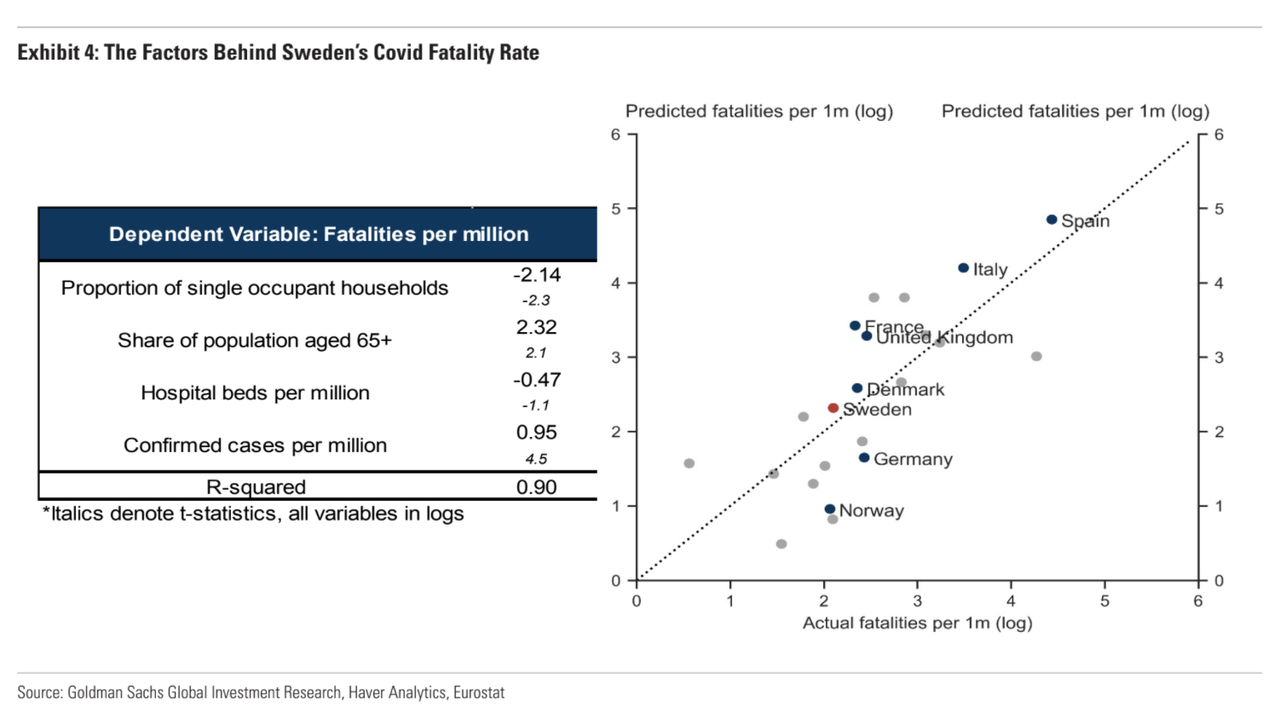Goldman Explains Why Sweden's Coronavirus Success Simply Can't Be Replicated In Europe & The US
Even Americans and Brits who are actively trying to filter out information pertaining to the coronavirus pandemic have probably heard something about how Sweden has managed to keep its economy operating at close to full capacity while avoiding the devastating lockdowns seen in the US and parts of Europe.
In a column we ran yesterday, 21stCenturyWire's Patrick Henningson argues that Sweden has already "won the policy debate" on how to best tackle the coronavirus. Many epidemiologists have argued that comparatively successful testing regimes might obviate the need for lockdowns, though Sweden's testing has been far less comprehensive than many might expect.
But in a research note published Monday, a team of analysts at Goldman Sachs confronts the question of whether Sweden is truly a viable model for other EU member states - and particularly the "EMU-4" - Italy, Spain, France and Germany.
In the report, the team concludes that unfortunately, Sweden's approach likely can't be easily replicated by the rest of the world.
* * *
Sweden has imposed significantly less strict measures to curb the spread of the coronavirus compared with other major European economies (left panel, Exhibit 1). While legal factors might have played a role - the Swedish constitution does not allow for a state of emergency in peacetime - the Swedish government has put the emphasis on citizens’ self-responsibility.
Although gatherings of more than 50 people are banned and distance learning in high schools has been introduced, these measures are much less stringent than elsewhere in Europe.
Some commentators have suggested that Sweden is aiming for herd immunity, although this is not official government policy. As a result of the less stringent measures, high-frequency proxies suggest activity in Sweden has slowed by less than in other economies in Europe.
This also is true when looking at Norway and Denmark, which are more similar in nature to Sweden in terms of demographics and economy.
Despite a less aggressive response than in the EMU-4, Sweden has experienced slower growth of confirmed cases of coronavirus and one of the lower fatality rates than other European countries. However, a striking comparison arises between Sweden and Norway: Sweden has more confirmed cases than Norway despite a lower testing rate, which, all else equal, suggests that the number of undetected cases in Sweden could be even higher (Norway has performed 31,835 tests per million inhabitants, while the figure for Sweden is 11,833). Taking the numbers at face value, our previous work suggests that one reason for this gap in the number of confirmed cases in Norway and Sweden is Sweden’s more lenient approach to containment measures, which have been effective at limiting the spread of the coronavirus.
While Sweden and Norway have broadly similar demographic characteristics, there are likely a number of idiosyncratic factors that sets these countries apart from other major European economies. Focusing on Sweden, there is anecdotal evidence to suggest that Swedes practise social distancing of their own accord, without fines or binding legislation. For example, newspaper reports suggest that public transport usage has fallen by 50% and streets are about 70% less busy than usual in Stockholm.
Sweden also has more favourable geographic and demographic factors relative to the EMU-4 which are likely to slow the spread of the virus: its population density is about half that of Italy, and Sweden has a high proportion of single-occupancy households (left panel, Exhibit 3), and a relatively low proportion of multi-generational households.
Beyond testing capacity, another factor that will likely play an important role in shaping re-opening is the ability to contain the human cost in terms of fatalities. Germany, for example, has a lower fatality rate than other economies and its health system is well-equipped to cope with the coronavirus pandemic (right panel, Exhibit 3). To assess countries’ likely ability to contain fatalities from the coronavirus, we therefore estimate a simple model to quantify the importance of demographic and health factors (left panel, Exhibit 4). The model is estimated on a cross-section of 22 European economies.
As explanatory variables, we include the proportion of single-occupancy households (which reduce transmission risks and are a proxy for younger households), the share of the population aged 65 and older, hospital beds per million inhabitants as a measure of health system capacity, and confirmed cases per million.
Despite its simplicity, the cross-sectional fit of the model is good, with an R-squared of 0.90 (right panel, Exhibit 4).
The Swedish experience is therefore not vastly different from other economies: the factors that explain fatality rates elsewhere also have explanatory power in Sweden. However, Sweden’s success in limiting fatalities might be hard to reproduce in other countries: while Sweden does have lower hospital capacity, demographic factors appear to counteract this.
While the model predicts a broadly similar fatality rate in Sweden and Denmark, it suggests that the Swedish fatality rate would be about a third lower if it had the same hospital capacity as Norway. We conclude that Sweden is not particularly suited as a reference point for the coronavirus response of other countries, as our analysis suggests that lower infection rate is likely to reflect in part less testing, while demographic and healthcare factors may help explain the fatality rate. In our view, the Swedish experience therefore can not be extrapolated to support a swift reopening elsewhere. That said, our analysis suggests that Germany could be in a better position to lift containment measures than southern Europe.
* * *
Source: Goldman Sachs
https://ift.tt/3c4STjP
from ZeroHedge News https://ift.tt/3c4STjP
via IFTTT






0 comments
Post a Comment